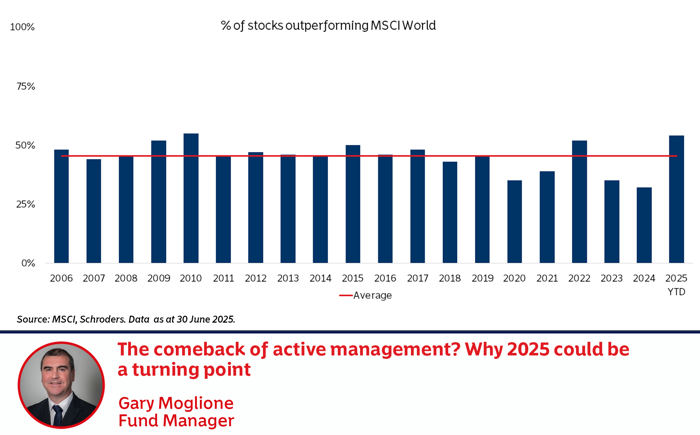
What this chart shows
For years, active managers have struggled to outperform the MSCI World Index. The culprit? A narrow market dominated by a handful of mega-cap tech stocks. When only a small percentage of stocks are beating the index, it becomes incredibly difficult for diversified active portfolios to keep up.
But 2025 may be changing the game.
In the first half of this year, the percentage of stocks outperforming the MSCI World has surged, a sharp reversal from the trend of recent years. This broadening of market leadership is a welcome shift for active managers, who rely on dispersion and opportunity to generate alpha.
According to recent data, the MSCI World Ex-USA Index rallied 19% in H1 2025, compared to just 6% for the S&P 500. Even more telling, the S&P 493 (the S&P 500 excluding the “Magnificent 7”) outperformed the mega-cap cohort for the first time in years. This suggests that gains are no longer concentrated in a few names, a critical condition for active strategies to thrive.
Why this is important
Why does this matter? Because when more stocks are contributing to returns, active managers have a better chance of identifying winners and avoiding losers. It’s not just about riding the wave of a few tech giants, it’s about stock picking, sector rotation, and fundamental analysis.
This shift could mark the beginning of a new cycle; one where active management regains its edge. For investors who’ve grown disillusioned with passive strategies, now might be the time to reconsider.
The chart below tells the story: after years of declining breadth, the percentage of stocks outperforming the MSCI World is finally rising. If this trend continues, 2025 could be remembered as the year active management made its comeback.
Markets are riding high on tech and AI momentum – but sustained by fragile undercurrents: inflation pressures, escalating tariff threats and political uncertainty suggest recent gains may face turbulence ahead.

-
US Treasury yields dipped and Wall Street equities were barely changed on Friday as investors waited for corporate earnings and monitored the latest tariff threats while they digested a mixed economic picture.
-
US inflation picked up: June CPI rose to 2.7%, core at 2.9%, fuelled largely by tariff pass-through into consumer prices.
-
Federal Reserve Governor Christopher Waller said US policymakers should cut interest rates this month to boost a job market that that looks to be weakening.
-
Speculation intensifies over President Trump potentially firing Fed Chair Powell, with betting markets on his replacement and rising concern that politicising the Fed could undermine inflation control credibility.

-
The FTSE 100 surged, briefly surpassing 9,000 intraday before cooling off—driven by renewed investor rotation toward UK-listed stocks.
-
UK economy sheds jobs for fifth consecutive month in June with companies facing higher taxes and uncertainty from US trade war.
-
The chief executive of Canada's largest bank has warned the UK government against introducing a new wealth tax, saying it would compound non-dom exodus.
-
Chancellor Reeves launches "Leeds Reforms": A sweeping package to deregulate financial services including relaxing ring-fencing, easing mortgage/mortgage affordability, streamlining senior manager certifications, and boosting retail investment.

-
President Trump is reportedly pushing for 15%-20% minimum tariff on all EU goods, throwing a wrench in negotiations ahead of 1 August deadline for sweeping duties to take effect.
-
The EU rolled out new sanctions and oil price caps on Russia, aiming to tighten economic pressure.
-
ECB cautious on rate moves amid euro strength: Policymakers signalled a hold on interest rate cuts, citing the euro's ~12% rally’s disinflationary effects.
-
On Thursday, Beijing will host an EU-China summit. The gathering marks a celebration of 50 years of diplomatic ties between the two great trading powers.

-
Japan's ruling coalition lost control of the upper house in Sunday's election, public broadcaster NHK reported, an outcome that further weakens Prime Minister Shigeru Ishiba's grip on power as a tariff deadline with the United States looms.
-
China's exports of rare earth magnets to the US in June soared to more than seven times their May level, marking a sharp recovery in the flow of critical minerals used in electric vehicles and wind turbines after a Sino-US trade deal.
-
Chinese startup Unitree Robotics has started the "tutoring" process for a potential initial public offering (IPO), aiming to capitalise on investor interest in humanoid robots. China is well-positioned to lead this frontier industry due to its strong manufacturing supply chains, government subsidies, and favourable policies.
-
President Ahmed al-Sharaa of Syria accused Israel on Thursday of seeking to sow “chaos” in the country, hours after the Israeli military carried out airstrikes in Damascus near the presidential palace and damaged part of the Ministry of Defence building.
